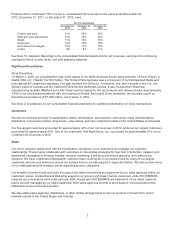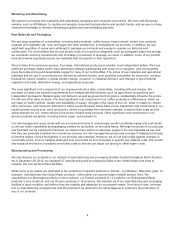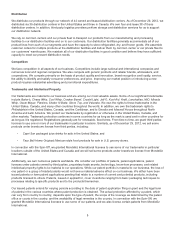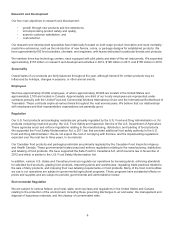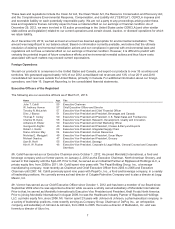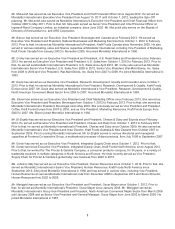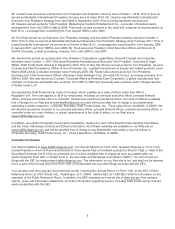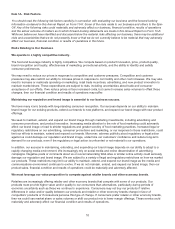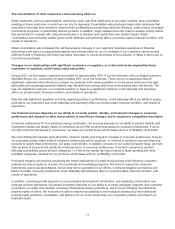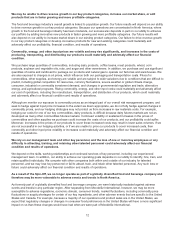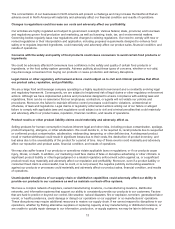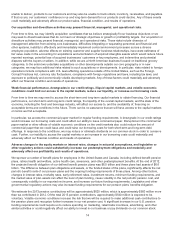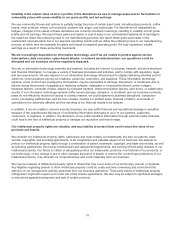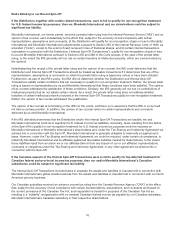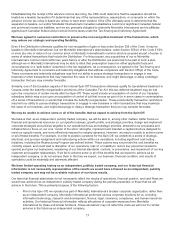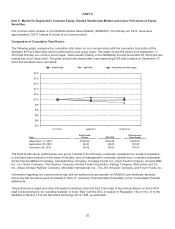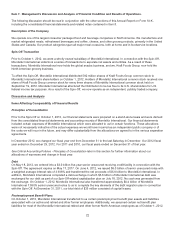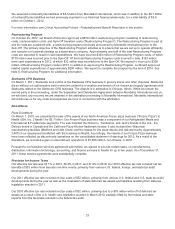Kraft 2012 Annual Report Download - page 15
Download and view the complete annual report
Please find page 15 of the 2012 Kraft annual report below. You can navigate through the pages in the report by either clicking on the pages listed below, or by using the keyword search tool below to find specific information within the annual report.The concentration of our businesses in North America will present a challenge and may increase the likelihood that an
adverse event in North America will materially and adversely affect our financial condition and results of operations.
Changes in regulations could increase our costs and adversely affect our profitability.
Our activities are highly regulated and subject to government oversight. Various federal, state, provincial, and local laws
and regulations govern food production and marketing, as well as licensing, trade, tax, and environmental matters.
Governing bodies regularly issue new regulations and changes to existing regulations. Our need to comply with new or
revised regulations or their interpretation and application, including proposed requirements designed to enhance food
safety or to regulate imported ingredients, could materially and adversely affect our product sales, financial condition, and
results of operations.
Concerns with the safety and quality of food products could cause consumers to avoid certain food products or
ingredients.
We could be adversely affected if consumers lose confidence in the safety and quality of certain food products or
ingredients, or the food safety system generally. Adverse publicity about these types of concerns, whether or not valid,
may discourage consumers from buying our products or cause production and delivery disruptions.
Legal claims or other regulatory enforcement actions could subject us to civil and criminal penalties that affect
our product sales, reputation, and profitability.
We are a large food and beverage company operating in a highly regulated environment and a constantly evolving legal
and regulatory framework. Consequently, we are subject to heightened risk of legal claims or other regulatory enforcement
actions. Although we have implemented policies and procedures designed to ensure compliance with existing laws and
regulations, there can be no assurance that our employees, contractors, or agents will not violate our policies and
procedures. Moreover, the failure to maintain effective control processes could lead to violations, unintentional or
otherwise, of laws and regulations. Legal claims or regulatory enforcement actions arising out of our failure or alleged
failure to comply with applicable laws and regulations could subject us to civil and criminal penalties that could materially
and adversely affect our product sales, reputation, financial condition, and results of operations.
Product recalls or other product liability claims could materially and adversely affect us.
Selling products for human consumption involves inherent legal and other risks, including product contamination, spoilage,
product tampering, allergens, or other adulteration. We could decide to, or be required to, recall products due to suspected
or confirmed product contamination, adulteration, misbranding, tampering, or other deficiencies. A widespread product
recall or market withdrawal could result in significant losses due to their costs, the destruction of product inventory, and
lost sales due to the unavailability of the product for a period of time. Any of these events could materially and adversely
affect our reputation and product sales, financial condition, and results of operations.
We may also suffer losses if our products or operations violate applicable laws or regulations, or if our products cause
injury, illness, or death. In addition, our marketing could face claims of false or deceptive advertising or other criticism. A
significant product liability or other legal judgment or a related regulatory enforcement action against us, or a significant
product recall, may materially and adversely affect our reputation and profitability. Moreover, even if a product liability or
consumer fraud claim is unsuccessful, has no merit, or is not pursued, the negative publicity surrounding assertions
against our products or processes could materially and adversely affect our product sales, financial condition, and results
of operations.
Unanticipated disruptions of our supply chain or distribution capabilities could adversely affect our ability to
provide our products to our customers as well as maintain our back-office systems.
We have a complex network of suppliers, owned manufacturing locations, co-manufacturing locations, distribution
networks, and information systems that support our ability to consistently provide our products to our customers. Factors
that are hard to predict or beyond our control, like weather, natural disasters, fire or explosion, terrorism, generalized labor
unrest, or health pandemics, could damage or disrupt our operations or our suppliers’ or co-manufacturers’ operations.
These disruptions may require additional resources to restore our supply chain. If we cannot respond to disruptions in our
operations, whether by finding alternative suppliers or replacing capacity at key manufacturing or distribution locations, or
are unable to quickly repair damage to our information, production, or supply systems, we may be late in delivering, or
13


